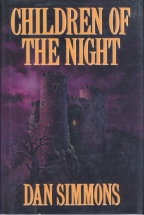Children of the Night
GP Putnam Hardcover
US Hardcover First
ISBN 0-399-13717-3
Publiation Date: 07-1992
382 pages; $21.95
Date Reviewed: 07-1992
Reviewed by: Rick Kleffel © 2002
|

|
|
REFERENCES
|
COLUMNS
|
|
Horror,
Science
Fiction
|
01-25-02,02-14-02,03-18-02,
04-15-02,
05-30-02,
10-08-02,
02-25-03,
04-30-03,
10-22-03,
10-29-03
|
The voice of the vampire -- powerful, unscrupulous, passionate --
is arguably the most enjoyable aspect of any vampire novel. That's
why Anne Rice's romantic outcasts, who speak so eloquently, have
captured the imaginations of so many readers. But not every writer
sees the vampire as does Anne Rice.
Dan Simmons' "Children of the Night" begins in the political
nightmare of post-Ceaucescu Romania. Narrator Vernon Trent is a
billionaire leading an "International Assessment Contingent" on a
tour of terror through a landscape as bleak as that of Nazi Germany.
While it might be hard to believe that events already fading from our
sound-byte size memories could be this horrific, Simmons sucks you in
and makes you believe. "In Sibu, we found the hidden children...The
AIDS ward was behind four sets of locked doors. There were no nurses
there, no doctors...no adults of any kind. Neither were there
cribs..." Like a cockroach burrowing into a corpse, Trent seems to
feed on this banquet of misery. Then he reveals himself to be a
vampire, and not just any vampire, but Dracula himself. It's not a
particularly terrifying revelation. In fact, it dilutes the power of
the political horror that has preceded, rather than punching it
up.
But Simmons' follow-up is at first disappointing. He switches to
the third-person narration of Kate Neumann, a "brilliant
hematologist" sent to Romania to help alleviate the suffering left in
the wake of Ceaucescu's terrors. Her skills are challenged by an
abandoned infant with a blood disease that requires regular blood
transfusions. Simmons comes up with a remarkably convincing Robin
Cook-style medical definition of this condition that explains
vampirism. But his main character, Kate Neumann, doesn't easily
connect with the reader; she's a remote scientist who adopts the
infant and returns to America. When the infant is kidnapped, Neumann
returns to Romania to retrieve him. At this point the novel loses its
speculative momentum and takes off as a thriller. But while we
certainly hope that Kate will save the baby, readers will be more
interested in hearing what Dracula has to say.
Simmons states that he has researched Dracula's life, and it
shows. In first-person interludes sprinkled throughout the thriller,
he captures the brutal brilliance that foreshadowed Ceaucescu four
centuries before he was born. "I remember with a joy that not even
such oceans of time have been able to dim, that Easter Sunday of
1457. I had invited the boyars -- those noble couples who felt that I
ruled at their pleasure -- to a great feast in Tirgoviste. It was a
beautiful spring day, warmer than most. The sky was a deep and
terrible blue. I remember that the boyars cheered me, their ladies
waving lace handkerchiefs....I doffed my plumed cap in response to
their cheers. It was the signal my soldiers were awaiting. The oldest
boyars and their wives I ordered impaled on the stakes I had readied
outside the city walls..." Dan Simmons has created a strong and
stirring voice in which to speak, a voice that gives this novel
enormous power in the end. For while the thriller elements of this
novel are tense and well-described, it is the voice of the vampire
that readers will remember.
